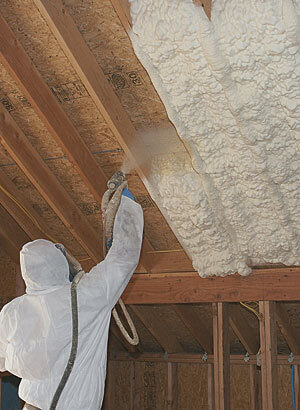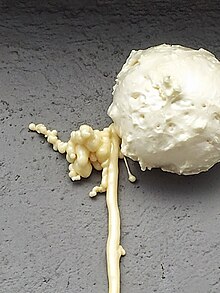Recognizing the Benefits of Using Spray Foam for Insulation Projects
Recognizing the Benefits of Using Spray Foam for Insulation Projects
Blog Article
Spray Foam: The Ultimate Service for Air Sealing and Insulation
Spray foam insulation has actually arised as a leading remedy for efficient air securing and thermal insulation, supplying a special mix of homes that set it aside from standard techniques. Its ability to increase and fill up spaces makes it especially efficient in avoiding air leak, which can significantly affect energy efficiency. Nevertheless, comprehending the complete range of its advantages, setup processes, and comparisons with various other insulation kinds is essential for making educated decisions. As we discover these elements, the implications for both new building and constructions and retrofits come to be progressively significant. What factors should affect your option?
What Is Spray Foam?
Spray foam is a functional insulation material that incorporates the principles of air securing and thermal resistance to enhance power efficiency in structures. Made up mainly of polyurethane or various other similar substances, spray foam is used as a liquid that expands upon call with surface areas, developing a solid, continual layer of insulation. This unique residential or commercial property permits it to fill spaces, splits, and gaps that conventional insulation products might overlook, offering a premium air seal.
There are two primary kinds of spray foam: open-cell and closed-cell. Open-cell spray foam is lighter and more flexible, offering exceptional audio absorption and a reduced R-value per inch - Spray Foam. On the other hand, closed-cell spray foam is denser, offering a greater R-value, dampness resistance, and included architectural integrity to building elements
The application process commonly entails specialized equipment, guaranteeing a smooth application that complies with different substratums, consisting of metal, wood, and concrete. This flexibility makes spray foam ideal for both brand-new constructions and retrofitting existing structures. Its ability to create an impermeable obstacle dramatically adds to lowering power usage and enhancing indoor air quality, thus making it a preferred choice amongst building contractors and homeowners alike.
Advantages of Spray Foam Insulation
One of the most substantial benefits of spray foam insulation is its outstanding capability to create a continuous air obstacle, which efficiently minimizes power loss. Unlike standard insulation materials, spray foam increases to fill up fractures and gaps, making certain that air leakage is significantly minimized. This particular not just enhances energy performance but additionally brings about reduce utility costs in time.
Additionally, spray foam insulation gives exceptional thermal resistance, contributing to a much more secure indoor setting. Its high R-value per inch enables reliable insulation in restricted areas, making it optimal for attic rooms, walls, and crawl areas. The moisture-resistant residential properties of spray foam help protect against mold and mildew development, promoting much healthier living problems.
Another important advantage of spray foam insulation is its sound-dampening qualities (Spray Foam). It successfully lowers sound transmission in between areas, producing a quieter and much more comfortable home atmosphere. The durability of spray foam also attracts attention, as it does not droop or settle in time, preserving its performance throughout its life expectancy
Exactly How Spray Foam Works
Comprehending exactly how spray foam insulation works is vital for appreciating its efficiency in air sealing and thermal resistance. Spray foam insulation contains two primary components: isocyanate and polyol material. When these parts are combined, they go through a chain reaction that triggers the material to expand swiftly, developing a thick foam that fills up voids, dental caries, and cracks.
As the foam expands, it sticks to surfaces, creating a closed seal that dramatically decreases air infiltration. This characteristic makes spray foam insulation very effective at preventing drafts and dampness penetration, which can lead to power loss and damage with time. Furthermore, the closed-cell variant of spray foam supplies exceptional thermal resistance due to its stiff structure, effectively reducing warmth transfer.
The special buildings of spray foam enable it to satisfy irregular surface areas, guaranteeing thorough protection and a smooth barrier. Therefore, spray foam insulation not just enhances power performance however additionally contributes to enhanced interior air quality by minimizing the buildup of allergens and contaminants. Eventually, comprehending the technicians behind spray foam highlights its duty as an exceptional option for insulation and air securing in both industrial and household applications.
Installment Refine Introduction

Prior to installation, the space needs to be properly cleaned up and prepped, making certain that surfaces are totally free from dirt, moisture, and debris. Because contaminants can compromise adhesion and overall efficiency, this step is vital. As soon as the location is prepared, the application includes mixing the two components of the spray foam, which broadens upon contact and fills up spaces efficiently.
Trained professionals ought to carry out the installation, utilizing customized tools to make sure uniform coverage and optimal thickness. Security safety measures, including wearing protective equipment and ensuring correct air flow, are essential during this procedure. After application, the foam commonly treatments promptly, creating a strong barrier that improves energy performance.
Contrasting Spray Foam to Typical Insulation
When evaluating insulation alternatives, spray foam insulation stands out in contrast to traditional materials such as fiberglass and cellulose. Unlike fiberglass and cellulose, which can permit air infiltration, spray foam expands upon application, loading gaps and gaps to develop a closed seal.
Additionally, spray foam provides a greater R-value per inch than traditional insulation kinds, offering even more effective thermal resistance in a thinner account. This characteristic is especially advantageous in rooms with restricted dental caries depth. Spray foam is resistant to dampness pop over to this web-site and mold growth, which can be a significant worry with cellulose and fiberglass, particularly in damp settings.
Nevertheless, spray foam insulation commonly carries a higher ahead of time price than its conventional equivalents. Home owners should evaluate this first financial investment against long-term energy financial savings and efficiency benefits. Ultimately, while both insulation types serve their function, spray foam becomes an advanced service for contemporary insulation requirements, specifically in regards to air securing and thermal performance.

Conclusion
In summary, spray foam insulation represents a highly effective solution for achieving optimal air sealing and thermal resistance. Its unique residential or commercial properties, including moisture resistance and sound dampening, make it ideal for numerous applications in both brand-new building and constructions and retrofitting jobs (Spray Foam). Although the preliminary expenses may be higher contrasted to typical insulation products, the long-lasting benefits, such as significant power financial savings and enhanced indoor air quality, justify the financial investment and emphasize its value in modern structure techniques.
Spray foam insulation has actually emerged as a leading solution for efficient air sealing and thermal insulation, supplying a their explanation special combination of buildings that set it apart from traditional techniques.Spray foam is a versatile insulation product that combines the concepts of air sealing and thermal resistance to improve energy effectiveness in structures.When examining insulation options, spray foam insulation stands out in comparison to typical materials such as fiberglass and cellulose. Inevitably, while both insulation types serve their objective, spray foam emerges as a More about the author much more advanced option for modern-day insulation needs, specifically in terms of air sealing and thermal effectiveness.
In recap, spray foam insulation represents a highly efficient solution for accomplishing optimum air securing and thermal resistance.
Report this page